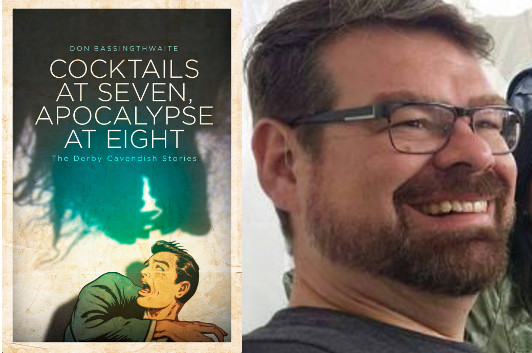Don Bassingthwaite: Lovecraft Meets Maupin for the Holidays

photo courtesy ChiZine Publications
The stories in Don Bassingthwaite‘s Cocktails at Seven, Apocalypse at Eight are a hilariously campy addition to the tradition of supernatural stories for the holidays. It’s not just ghosts, although there is a ghost with a particularly Saturnalian thirst. Derby Cavendish, Bassingthwaite’s occult specialist, also comes across Krampus, a minotaur, a werewolf who’s also a drag queen, and a otherworldly spirit who manifests in the form of hideous Christmas sweaters. In this guest essay, Bassingthwaite explains how a Lovecraft pastiche that wasn’t quite working got boosted to a whole new level thanks to Tales of the City. Does that sound like a bit much? Well, as he says, “Stay with me on this because it works out.”
The very first incarnation of Derby Cavendish was in a story that I wrote nearly twenty years ago for submission to Strange Tales magazine. “Derby Cavendish and the Thing in the Cellar” was a gay pastiche of a Lovecraft story. It hit almost every Lovecraftian trope—Esoteric allusions! Eerie settings! Warped space-time! Squamous tentacles!—as it followed a dauntless and witty hero facing an Ancient Evil lurking in the basement of a gay bar.
I loved it. Strange Tales did not.
In hindsight, I can understand why. The Lovecraft influences were too strong, too blatant, too—in a word—sprawling. “The Thing in the Cellar” clocked in at almost 10,000 words. It was not a good story and, no, it’s not in Cocktails at Seven. But Derby was a good character. He was smart and confident. He didn’t let anything get in his way. He was magical in a world of secret magic and he was fearlessly flamboyant. He may have grown out of Lovecraft but he needed a better, more vibrant story—and story structure—than a Lovecraft pastiche could provide.
Which is where Armistead Maupin comes in.
If you’re not familiar with the Tales of the City books, they’re a slice of San Francisco life, written and set (at first) in the late 1970s and early ’80s. They’re full of wonderful characters both gay and straight interacting on a personal level and with larger events. They feel real, yet at the same time dramatic and thrilling. More importantly for my Derby Cavendish stories, Tales of the City started as a serial in the San Francisco Chronicle, each installment short and spare but captivating.
I adore Maupin’s magnificent stories and his amazing short form storytelling. His books are also the opposite of Lovecraft in almost every way: light and airy instead of dark and gothic, sparse instead of overblown, and focused on character rather than setting, with allusions that come across more like gossip than the arcana of lost ages. And, of course, they’re gloriously gay.
In 2010, when I was invited by the organizers of the Chiaroscuro Reading Series here in Toronto to read at their inaugural Very Special Christmas Special, I knew immediately that I wanted to revisit Derby Cavendish. The brief for the evening was to read something funny—and short. H.P. Lovecraft had already made a mark on Derby Cavendish, but as I wrote the my new story, I also kept Tales of the City in mind. Short. Fast-paced. Airy. Full of character. Gossipy. Gay I had covered.
The story from that first Christmas special was “Fruitcake,” the lead story in Cocktails at Seven, Apocalypse at Eight, and it was a hit. I’ve been reading a Derby Cavendish story at the Chiaroscuro Series holiday special every year since. I know they wouldn’t have been the same without the dual influence of H.P. Lovecraft and Armistead Maupin. I don’t imagine Lovecraft would be very impressed by them, but I like to think Maupin might.
24 December 2016 | selling shorts |

 Our Endless and Proper Work is my new book with Belt Publishing about starting (and sticking to) a productive writing practice.
Our Endless and Proper Work is my new book with Belt Publishing about starting (and sticking to) a productive writing practice. 
